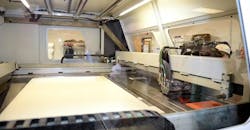Researchers Studying Cybersecurity in Sand 3DP
3D-printing of sand for metalcasting molds is the focal point for a research effort that has drawn funding from the U.S. Dept. of Energy’s Advanced Materials and Manufacturing Technologies Office. The R&D project, at The Ohio State University’s Center for Design and Manufacturing Excellence (CDME) is one of 10 that are sharing a total of $4.8 million in studying different issues relating to cybersecurity in manufacturing.
CDME’s work centers on methods to improve cybersecurity and operational efficiency of 3D-printed sand molds for metalcasting.
According to DOE, the OSU researchers in cooperation with the Cybersecurity Manufacturing Innovation Institute (CyManII) are building a powerline monitoring system for binder-jet additive printers. “By analyzing powerline data, the project seeks to identify and prevent cyber incursions, drawing parallels to network traffic anomaly detection. This approach involves measuring baseline power usage, applying machine learning algorithms, and creating distinctive power signatures to distinguish normal operation from potential cyberattacks,” the project description details.
Partnering with OSU and CyManII are 3Degrees, a renewable energy and carbon-offset consulting group; and Humtown Products, a manufacturer of sand molds and cores for metalcasting.
The team will demonstrate the deployment of the CyManII developed Cyber-Physical Passport – a digital identity-tracking tool that monitors product supply chains – to provide assurance of design intent to manufacture.
“The project not only enhances cybersecurity but also optimizes energy consumption and operational efficiency in additive manufacturing, thereby offering a comprehensive solution to industry challenges,” DOE explained.
